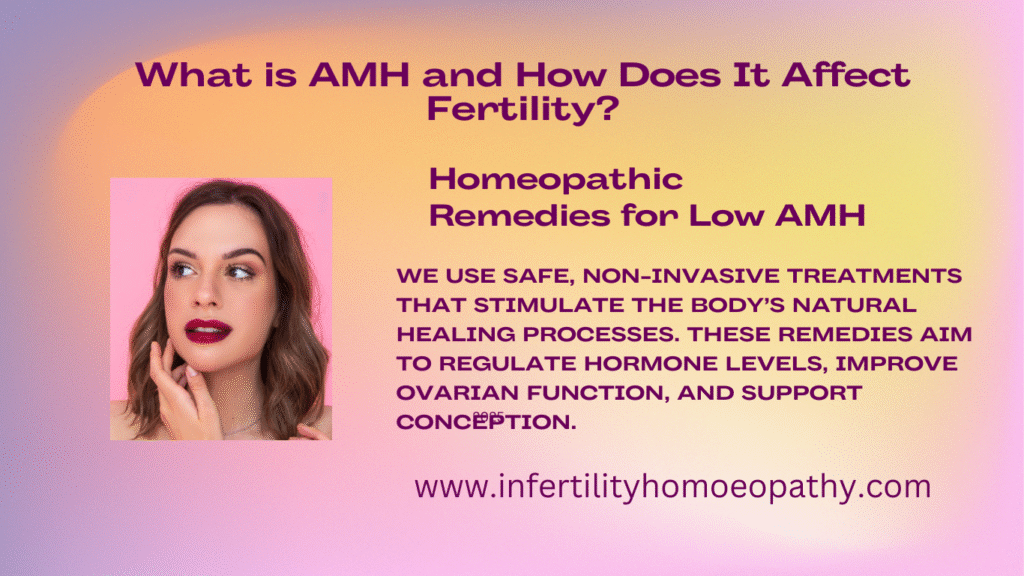Learn how AMH (Anti-Müllerian Hormone) impacts fertility and ovarian reserve. Discover natural homeopathic solutions from Carewell Homoeopathic Fertility Clinic to support reproductive health.
Understanding AMH – A Key Hormone in Fertility
Anti-Müllerian Hormone (AMH) is one of the most important markers when it comes to assessing ovarian reserve and overall fertility health. AMH is produced by the granulosa cells in the ovarian follicles and reflects the quantity and quality of eggs available in the ovaries. Unlike other hormones, AMH levels remain stable throughout the menstrual cycle, making it an ideal test for evaluating reproductive potential.
For women planning to conceive, understanding AMH can help them take informed steps to manage their fertility journey. At Carewell Homoeopathic Fertility Clinic, we combine medical knowledge with natural, holistic treatment to support ovarian health and improve chances of conception.
What is Anti-Müllerian Hormone (AMH)?
AMH is a glycoprotein hormone that plays a key role in follicle development. It helps prevent the premature depletion of the ovarian reserve by regulating follicular growth. A high or low level of AMH provides insight into how many eggs a woman has and how her fertility may be affected.
Key Points:
- AMH levels are used to assess ovarian reserve.
- AMH testing is useful for women planning pregnancy, undergoing IVF, or managing reproductive disorders.
- It’s considered one of the most reliable indicators of fertility potential.
How Low AMH Levels Impact Fertility
Low AMH is often a sign of diminished ovarian reserve, meaning fewer eggs are available for fertilization. It’s particularly common among women over the age of 35 but can also occur earlier due to various factors like genetics, medical treatments, or lifestyle issues.
Common Effects of Low AMH:
✔ Difficulty conceiving naturally
✔ Irregular menstrual cycles
✔ Increased risk of early menopause
✔ Hormonal imbalance
✔ Emotional distress due to fertility challenges
While low AMH can be concerning, it doesn’t mean you cannot conceive. With appropriate care, diet adjustments, stress management, and targeted homeopathic treatments, many women have successfully improved their reproductive health.
Hormonal Imbalance and Ovarian Health
Hormonal imbalances not only affect AMH but also disrupt ovulation, energy levels, and mental health. Stress, poor diet, and environmental toxins contribute to these imbalances.
At Carewell, we address hormonal irregularities holistically by:
- Balancing endocrine function through natural remedies
- Supporting adrenal health to reduce stress-induced fertility issues
- Enhancing immune function to prevent underlying health concerns
Natural Ways to Improve AMH Levels
While AMH is largely influenced by age and genetics, lifestyle factors can play a role in supporting ovarian health. Here are some scientifically backed approaches:
✔ A diet rich in antioxidants, zinc, and vitamins (like D and E)
✔ Regular moderate exercise to improve circulation
✔ Avoiding alcohol, smoking, and processed foods
✔ Stress management techniques such as yoga and meditation
✔ Personalized homeopathic treatments to regulate hormones
Carewell offers tailored programs combining these approaches to help improve AMH levels naturally and safely.
How Carewell Homoeopathic Fertility Clinic Supports You

At Carewell, we believe fertility care should be as unique as the individual. Our approach integrates natural healing with modern diagnostic tools to create a comprehensive plan for each patient.
Our Core Support Includes:
✔ Detailed hormonal profiling, including AMH testing
✔ Personalized homeopathic remedies targeting reproductive health
✔ Nutritional counseling and lifestyle guidance
✔ Continuous monitoring with expert care
✔ Emotional support and counseling throughout the treatment journey
Homeopathic Remedies for Low AMH
We use safe, non-invasive treatments that stimulate the body’s natural healing processes. These remedies aim to regulate hormone levels, improve ovarian function, and support conception.
FAQs About AMH and Fertility
Q1: How does low AMH affect chances of getting pregnant?
Low AMH indicates reduced ovarian reserve, making conception more challenging. However, with the right treatment and lifestyle adjustments, many women improve their fertility and successfully conceive.
Q2: What homeopathic treatments are available for low AMH?
Carewell offers individualized homeopathic treatments that support hormonal balance, improve ovarian reserve, and reduce stress—all essential for boosting fertility.
Q3: How can diet improve AMH and ovarian health?
A diet rich in fresh fruits, vegetables, seeds, and healthy fats supports hormonal health. Avoiding processed foods and toxins helps maintain optimal ovarian function.
Q4: When should I get an AMH test?
AMH can be tested at any time during your cycle, as its levels remain stable. It’s recommended when planning pregnancy, before IVF treatment, or when experiencing irregular cycles.
Q5: Can stress impact AMH and fertility?
Yes, stress hormones interfere with ovarian function and hormonal balance. Carewell provides counseling and stress-reduction methods to improve mental and reproductive health.
Patient Experiences – Real Journeys of Hope
Many women with low AMH have successfully conceived after working with Carewell. Through personalized treatment plans and consistent support, they’ve restored hormonal balance and achieved pregnancy naturally. Our patients’ stories are a testament to the power of natural, holistic care.
When to Get an AMH Test and How It Helps
An AMH test helps women understand their ovarian reserve and make informed fertility decisions. Whether planning pregnancy early or exploring assisted reproductive techniques, this test provides clarity and confidence.
At Carewell, we guide you through every step—from testing to treatment—ensuring you feel supported, informed, and empowered.

